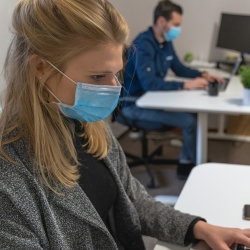To provide the best experiences, we use technologies like cookies to store and/or access device information. Consenting to these technologies will allow us to process data such as browsing behaviour or unique IDs on this site. Not consenting or withdrawing consent, may adversely affect certain features and functions.
The technical storage or access is strictly necessary for the legitimate purpose of enabling the use of a specific service explicitly requested by the subscriber or user, or for the sole purpose of carrying out the transmission of a communication over an electronic communications network.
The technical storage or access is necessary for the legitimate purpose of storing preferences that are not requested by the subscriber or user.
The technical storage or access that is used exclusively for statistical purposes.
The technical storage or access that is used exclusively for anonymous statistical purposes. Without a subpoena, voluntary compliance on the part of your Internet Service Provider, or additional records from a third party, information stored or retrieved for this purpose alone cannot usually be used to identify you.
The technical storage or access is required to create user profiles to send advertising, or to track the user on a website or across several websites for similar marketing purposes.
 First aid is a type of emergency care that is administered in the event of an injury. Volunteers within the community can receive this training so that they can help with emergencies before the proper authorities arrive on the scene. First aid includes CPR, cleaning wounds, and supporting breaks or sprains. A person giving first aid cannot fix a problem- that is for the paramedics and doctors to do. So, why is learning first aid so important, especially in the modern workplace? More →
First aid is a type of emergency care that is administered in the event of an injury. Volunteers within the community can receive this training so that they can help with emergencies before the proper authorities arrive on the scene. First aid includes CPR, cleaning wounds, and supporting breaks or sprains. A person giving first aid cannot fix a problem- that is for the paramedics and doctors to do. So, why is learning first aid so important, especially in the modern workplace? More →







 Nearly two-thirds of employees who claim to have experienced a toxic workplace culture say the compensation they received did not make up for the emotional distress caused, according to new research from
Nearly two-thirds of employees who claim to have experienced a toxic workplace culture say the compensation they received did not make up for the emotional distress caused, according to new research from 
 Research released by
Research released by 
 Seven in 10 (70 percent) of UK HR managers now say flexible working could work for their business – claims a new
Seven in 10 (70 percent) of UK HR managers now say flexible working could work for their business – claims a new 
 As the new Covid-19 variant, omicron, threatens to spread across the globe, research from
As the new Covid-19 variant, omicron, threatens to spread across the globe, research from 
 Predicting the future is a fool’s errand. History is littered with examples of people who got it horribly wrong. In 1876, William Orten, the president of then telegraphy pioneer Western Union, claimed that the telephone was an idiotic, ungainly and impractical idea that would never catch on. Almost a century later, Microsoft’s Bill Gates said that nobody would ever need more than 640KB of memory in a computer. Today’s home computers and laptops can store up to 32GB of memory.
Predicting the future is a fool’s errand. History is littered with examples of people who got it horribly wrong. In 1876, William Orten, the president of then telegraphy pioneer Western Union, claimed that the telephone was an idiotic, ungainly and impractical idea that would never catch on. Almost a century later, Microsoft’s Bill Gates said that nobody would ever need more than 640KB of memory in a computer. Today’s home computers and laptops can store up to 32GB of memory. 
 The so-called green agenda, sustainability and climate change have finally hit centre stage. Various announcements are being made by UK Government and numerous high profile figures are crying a call to action to implement carbon reduction plans now. Lord Mayor of the City of London, Alderman William Russell, stated at the
The so-called green agenda, sustainability and climate change have finally hit centre stage. Various announcements are being made by UK Government and numerous high profile figures are crying a call to action to implement carbon reduction plans now. Lord Mayor of the City of London, Alderman William Russell, stated at the 
 The latest research from
The latest research from 
 With the vast majority (86 percent) of UK businesses planning to offer employees greater flexibility around where they work, leaders are focused on ensuring employees feel included regardless of their location, according to new research from
With the vast majority (86 percent) of UK businesses planning to offer employees greater flexibility around where they work, leaders are focused on ensuring employees feel included regardless of their location, according to new research from 









December 6, 2021
We must wake up to the realities of workplace sustainability
by Oliver Cripps • Comment, Environment, Workplace design